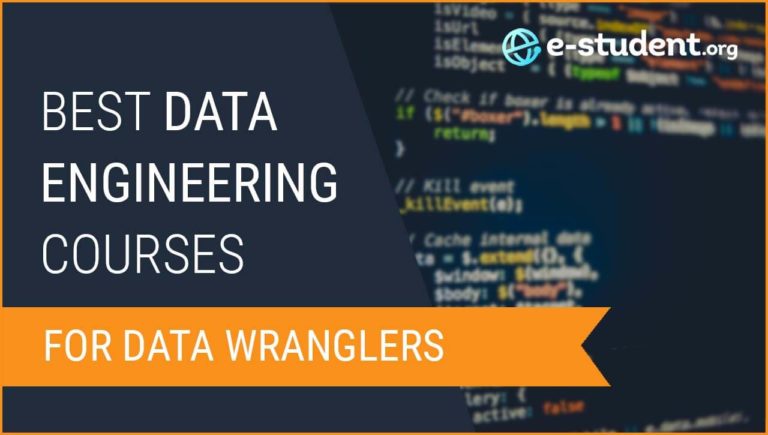
Data engineering is the fastest-growing tech occupation. That’s according to DICE’s 2020 Tech Jobs Report. In 2019, data engineering saw 50% year-on-year growth, 12% more than back end development and 18% more than data science. The conclusion here is obvious. If you’re looking to future-proof your career, data engineering is the field to be in.
“Data! Data! Data! I can’t make bricks without clay.”
— Sir Arthur Conan Doyle
But what is data engineering? And how does the role of a data engineer differ from that of a data scientist or data analyst?
Data engineering is the backbone of data science. Data engineers design, build, maintain, and test data management systems. These systems are vital for transforming data into formats data scientists and data analysts can use to create practical conclusions (and visualizations). As such, data engineers are just as important as data scientists, even though the latter make news headlines more often.
As Paul Lappas, the co-founder and CEO of Intermix, a performance monitoring solution, said in a Stitch interview, “It’s an unsexy job, but it’s super-critical. Data engineers are kind of like the unsung heroes of the data world. Their job is incredibly complex, involving new skills and new tech.”
What skills are we talking about? Programming languages like Python and SQL (R may come in handy, too) as well as tools and platforms like AWS, Apache Hadoop, Apache Hive, and Scala, says that same DICE report. Finding individuals with such a specialized skill set is no easy feat, which is why it takes 46 days on average to fill a data engineer position. Naturally, when a company does manage to hire a data engineer, they pay them well. According to Glassdoor, the average data engineer makes $102,864 (as of the time of writing this article).
Interested in going down the data engineer route but don’t know where to start? Below is a list of the seven best data engineering courses right now — all of which are available online.
These are the 7 best online data engineering courses.
Best Data Engineering Courses
Best Overall: Data Engineering Nanodegree (Udacity)
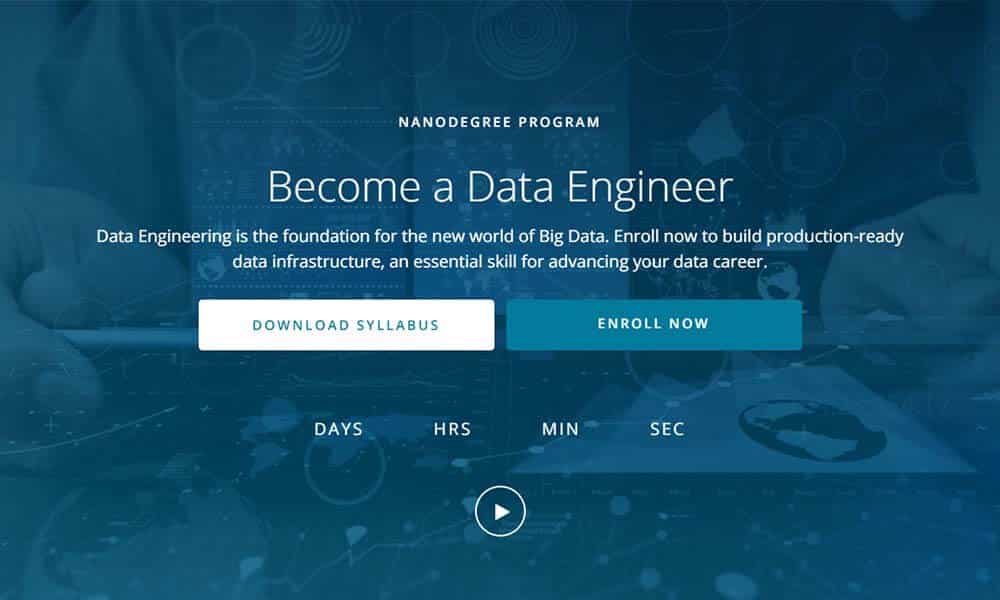
- Real-world projects with unlimited feedback
- Instructors that come from the data engineering field
- Career services and mentorship
- Takes an average of only 5 months to complete
Cons
- Prior knowledge of Python and SQL required
Udacity’s Data Engineering Nanodegree will teach you how to create data lakes and data warehouses and automate data pipelines. By the end of this nanodegree, you should be proficient in Spark, Airflow, and AWS tools.
The program, which was designed with input from experts from Uber, Slack, Stitchfix, and Insight Data Engineering, is split into five courses taught by different instructors. Each instructor has expertise in data engineering, so you’re definitely in good hands.
Four of the five courses include lectures, demos, and exercises. They each have one or two mini-projects that require you to roleplay as a data engineer at a music streaming company. The final course is a capstone project where you have to create a clean database that others can analyze.
In addition to course content, you also get unlimited project reviews and feedback, mentorship support, and career services. Plus, you gain access to a chat interface that lets you connect with other students, as well.
This nanodegree takes about five months to complete if you dedicate between 5 and 10 hours a week. Note that while this program accepts everyone, you’ll feel lost if you don’t have Python and SQL skills.
Not only does Udacity’s Data Engineering Nanodegree go over essential data engineering concepts, but it also keeps students motivated via mentorship support and provides career help. For this reason, it’s our top pick for online data engineering courses.
Best for Beginners: Data Engineering Career Learning Path (Coursera)
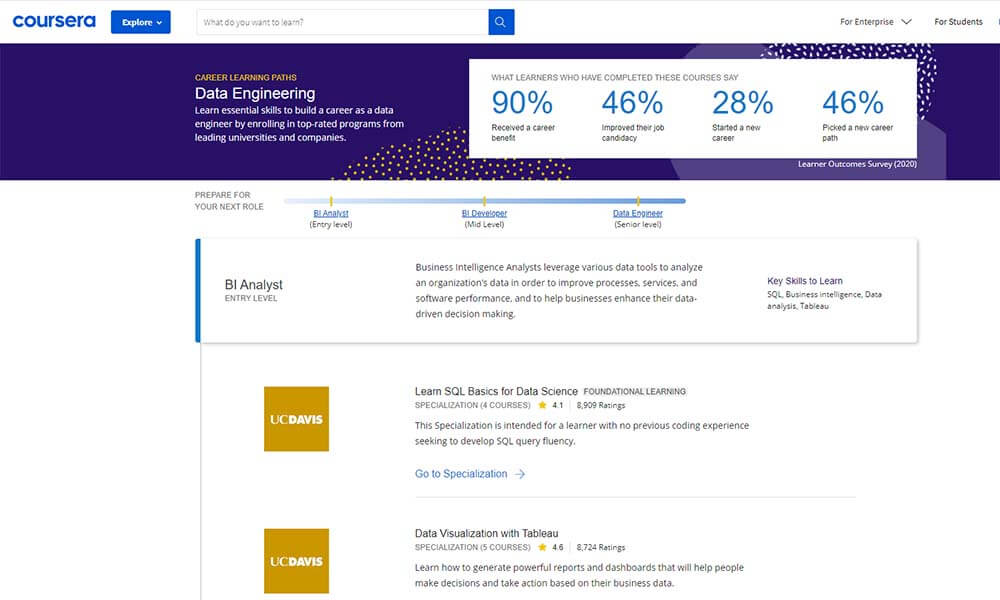
40% ($140 USD) off your first year of Coursera Plus Annual (expires 2 December 2024)
- Progress through different job roles
- Includes curated Specializations, courses, and professional certificates
- Plenty of hands-on projects
- No prior experience necessary
Cons
- Requires a large time commitment
The path to becoming a data engineer is not necessarily an easy one. However, Coursera’s Data Engineering Career Learning Path simplifies the process by breaking it down into a progression of job roles — from entry-level to experienced professional — and matching them with the corresponding Coursera programs.
Students start by prepping for a career as a Business Intelligence Analyst. The key skills you learn in this section are Business intelligence, data analysis, SQL, and Tableau. This section comprises three Specializations, two that are offered by the University of California, Davis and one that has been created by PwC.
Next, students learn what it takes to become a Business Intelligence Developer. Here, you’ll master software development, Python, SQL, and Javascript. This section consists of just one Specialization designed by the University of Minnesota.
The final section in this path is dedicated to — yes, you guessed it — becoming a successful data engineer. This section focuses on Python, big data, and ETL (extract, transform, load tools). It has one course by Stanford University, one Specialization by the University of California, Davis, and one professional certificate (Data Engineering with Google Cloud — more on this below.”)
There are no prerequisites to taking this learning path. You can expect to complete the entire path in about six to eight months.
One of the best data engineering programs on the market, the Data Engineering Career Learning Path by Coursera is a set of expertly curated courses that will eventually help you get a job in data engineering — without skipping the fundamentals.
Best Crash Course: Understanding Data Engineering (DataCamp)
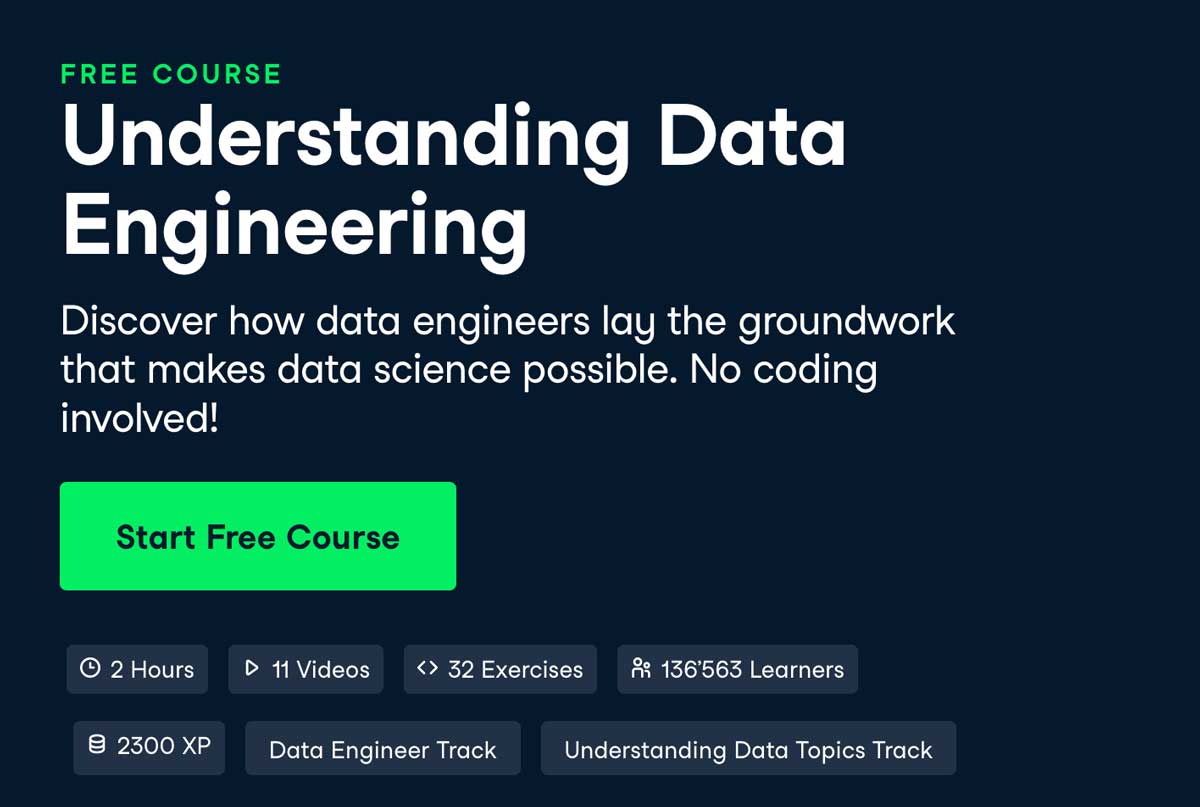
50% off Unlimited Data and AI Learning (expires 28 March 2024)
- All coding is done in-browser
- 32 real-life exercises
- Short and content-packed
- No prerequisites
Cons
- Largely theory-based
What is data engineering, and is it really the right career for you? You can find the answers to both questions by taking “Understanding Data Engineering,” one of the best data engineering programs for beginners.
This two-hour long DataCamp course is divided into three sections. Section one explains what data engineers do and how they’re different from data scientists. This section also introduces you to the data pipeline — a critical data engineering concept. Section two is all about data storage. This is where you’ll learn how data engineers use different data structures, work in SQL, and store data using data lakes and data warehouses. Finally, section three zeroes in on different data processing techniques.
These concepts are explained via short video lessons that are typically under ten minutes long. The material is reinforced through exercises (but don’t worry — the exercises are all theory-based, so you won’t have to write a single line of code!)
If you’d like to learn more about data engineering before you commit to a months-long course, DataCamp’s “Understanding Data Engineering” is exactly what you’re looking for. You don’t need to have any prior knowledge of data engineering to take this course. And, because the course is so short, you can complete it in one day.
Most Likely to Lead to Employment: Data Engineering Career Track (Springboard)
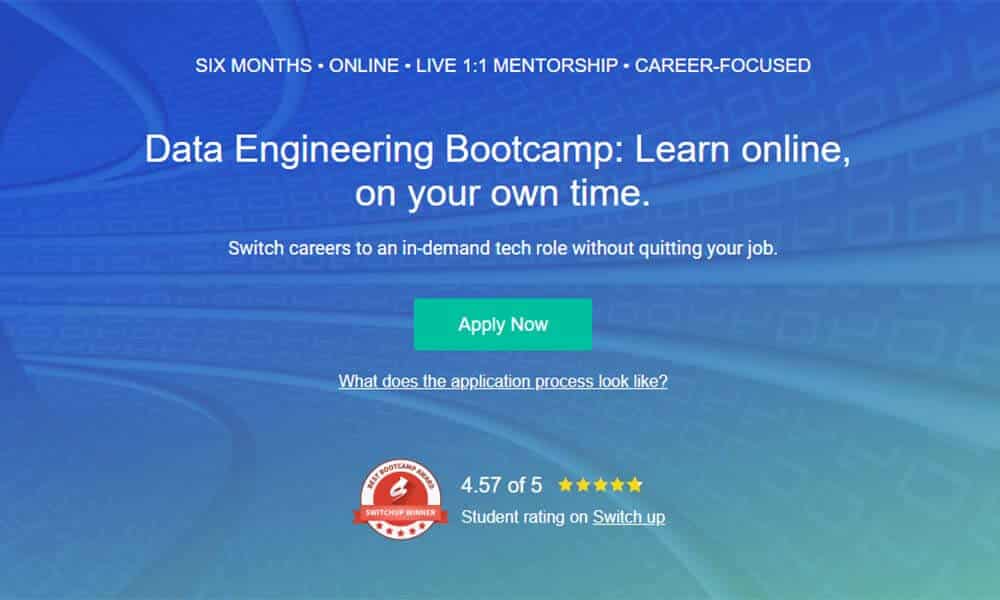
- Job guarantee within 6 months of graduation
- One-on-one mentorship
- 15 mini-projects and 2 capstone projects
Cons
- Proficiency in SQL and Python required
- Expensive
NOTE: As of September 2022, Springboard’s Data Engineering Career Track is no longer available. We recommend you consider their Data Science Career Track, which approaches the data from a somewhat different angle.
Although expensive, Springboard promises that you’ll have a job offer within six months of graduating from its Data Engineering Career Track (also known as Data Engineering Bootcamp) or else get your money back. However, this program isn’t called a “bootcamp” for nothing. To pass this program, you’ll need to spend a total of 450 hours learning theory, doing data engineering exercises and projects, and completing career-related coursework.
The program is split into seven modules, with each module highlighting one specific in-demand skill, like big data engineering and cloud data engineering. Most modules also show you how to use the most popular data engineering tools, such as Apache Hadoop, Apache Spark, Microsoft Azure, Apache Airflow, Docker, and Apache Kafka.
Once you complete all seven data engineering modules, you can move on to a career-specific curriculum. Here, you’ll understand how to write an effective resume and build an impressive portfolio. Speaking of your portfolio, as part of this bootcamp, you’ll have to dedicate around 20 hours to 15 technical mini-projects and two capstone projects.
If all that sounds a bit overwhelming, you’ll be glad to know that this bootcamp includes one-on-one mentorship. Every week, you’ll have a half an hour call with your mentor to discuss blockers and projects.
Note that to enroll in this program, students should have an analyst or software engineering background and knowledge of SQL and Python. Spots for this program are limited, so all applicants are required to fill out a questionnaire, which may be followed by a phone interview or a survey that tests your coding and data skills.
Considering that this bootcamp is 450 hours long and includes career services, it’s no surprise that the refund rate has only been 3%. Springboard also claims that upon completing this program, most students see an average salary increase of $25,800. With that in mind, it’s fair to say it’s one of the best online data engineering courses on the market.
Become a Data Engineer: Mastering the Concepts (LinkedIn Learning)
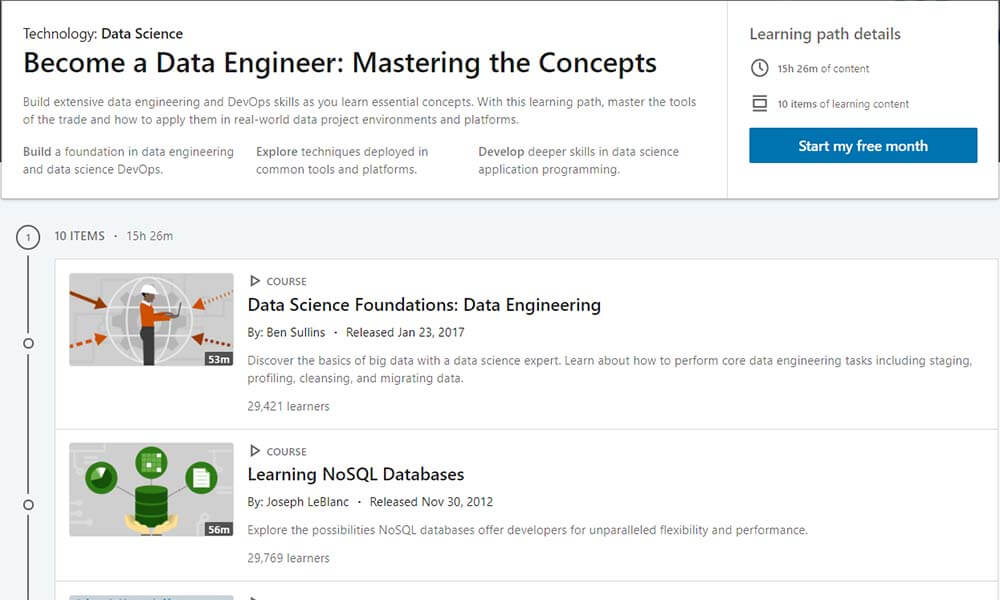
- Bite-sized chunks of content
- Includes projects and quizzes
- No prior experience necessary
- Data engineer certification at the end
Cons
- No capstone project
Become a Data Engineer: Mastering the Concepts is a LinkedIn learning path — a playlist of video courses related to data engineering. The path has 10 courses in total and 6 different instructors that teach various skills, including how to use NoSQL databases, Apache HBase, and Apache Spark.
Each course is between one and three hours long and is divided into bite-sized modules, further split into short lessons. Most modules are around 20 minutes long, whereas the vast majority of lessons are between one and five minutes long.
So, rather than dedicating a full evening to a study session, you can complete a few lessons, or even an entire module, in your spare time. All in all, it should take you no more than 15 hours and 30 minutes to finish the whole learning path.
Most courses include chapter quizzes and some have projects. However, there is no capstone project at the end of the learning path.
You don’t have to have any prior experience with data engineering or data analysis to take this learning path. Indeed, the path starts with data engineering foundations (i.e., an overview of the data science system and a data engineer’s place within it).
One of the best things about LinkedIn’s learning path Become a Data Engineer: Mastering the Concepts is that it follows a bite-sized learning format. This format allows you to learn anytime, anywhere. Even better? Completing this learning path gets you a LinkedIn data engineer certification!
Data Engineering with Google Cloud Professional Certificate (Coursera)
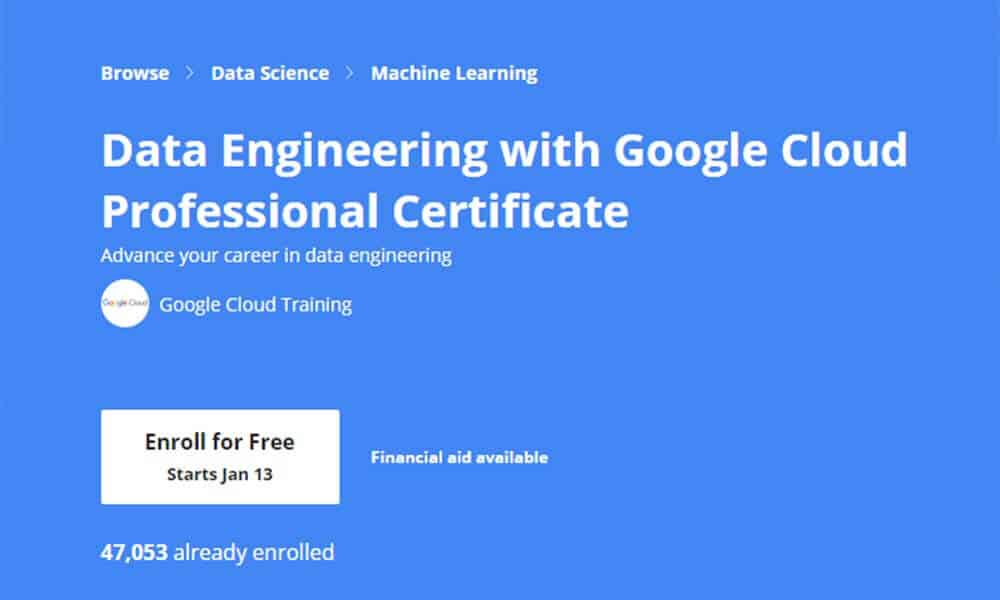
40% ($140 USD) off your first year of Coursera Plus Annual (expires 2 December 2024)
- Designed by Google Cloud
- Prepares you for the Google Cloud Professional Data Engineer Exam
- Comes with hands-on labs
- Includes quizzes and readings
Cons
- A long list of prerequisites
If you want to master Google’s powerful Cloud platform, then Data Engineering with Google Cloud Professional Certificate designed by Google Cloud and available on Coursera should be right up your street. As a bonus, completing this professional certificate should prepare you for the Google Cloud Professional Data Engineer Exam.
This professional certificate consists of six courses. Course one provides an overview of Google Cloud and its capabilities. Courses two, three, four, and five dive into data pipelines (with course four specifically looking at building streaming data pipelines and course five incorporating machine learning into data pipelines). Last but not least, course six prepares you for the Google Cloud certification.
Besides video lectures, readings, and quizzes, this professional certificate also includes hands-on labs via Google’s Qwiklabs platform. As part of these labs, you’ll learn how to use Google’s BigQuery.
Since you can complete most of the courses in between 8 and 13 hours, most students get to the end of the professional certificate in about a month and a half provided that they dedicate five hours a week to studying.
This program isn’t for everyone, though. Students interested in taking this course should know how to use a common query language (for example, SQL) and have basic experience creating applications with a programming language like Python. They should also have surface knowledge of data modeling and ETL and machine learning or statistics.
Data Engineering with Google Cloud Professional Certificate is one of the best data engineering programs you can take to learn how to develop data pipelines on Google Cloud. This professional certificate can also go a long way in helping you ace the Google Cloud Professional Data Engineer Certification Exam.
Data Engineering, Big Data, and Machine Learning on GCP Specialization (Coursera)
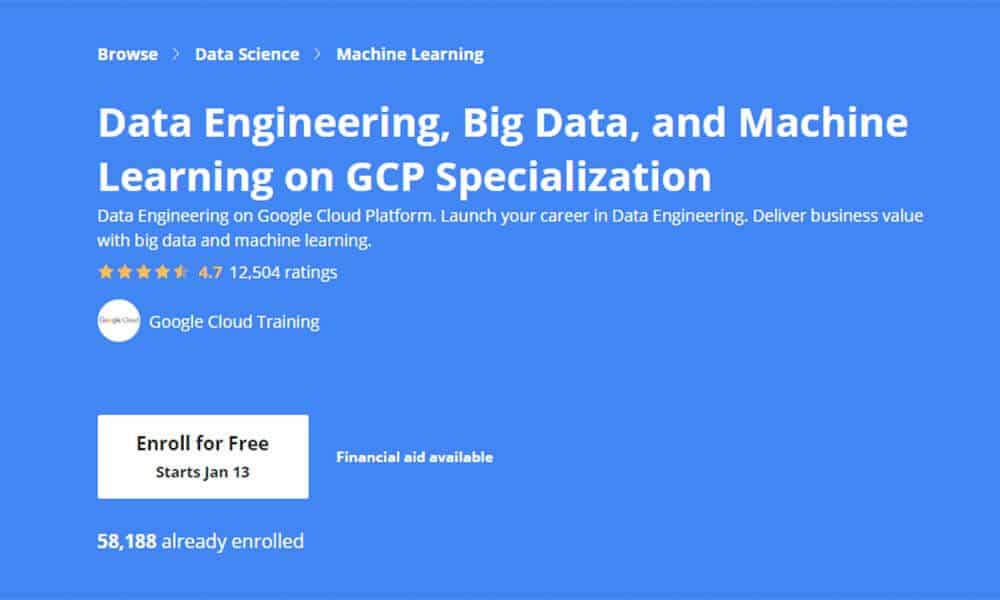
40% ($140 USD) off your first year of Coursera Plus Annual (expires 2 December 2024)
- Good introduction to the Google Cloud Platform
- Includes hands-on labs via Qwiklabs
- Takes only 4 weeks to complete
Cons
- Some of the labs are reported to have bugs and errors
- Content could be more in-depth
Coursera’s Data Engineering, Big Data, and Machine Learning on GCP Specialization is one of the best data engineering programs for getting started with the Google Cloud Platform (GCP). By the end of this program, you should be able to build data processing systems on GCP, leverage unstructured data, and implement auto-scaling data pipelines, among other things.
This Specialization consists of five courses. Each course includes video lessons, readings, and quizzes. Students also get to practice everything they learn through hands-on, easy to follow labs via Google’s Qwiklabs platform.
Because this Specialization is “accelerated,” you can complete it in just four weeks — as long as you put in the time to study, of course. The GCP free trial ends after 60 days.
Anyone can take this course, but it’s recommended that students have one year’s experience with at least one of the following: a common query language (like SQL), ETL (extract, transform, load activities), Python, data modeling, and machine learning or statistics.
Although Coursera’s Data Engineering, Big Data, and Machine Learning on GCP Specialization may feel a bit “salesy” at times, it provides an excellent high-level overview of the basics of GCP and how to manipulate it. For this reason, it’s one of the best online data engineering courses available for learning GCP.



